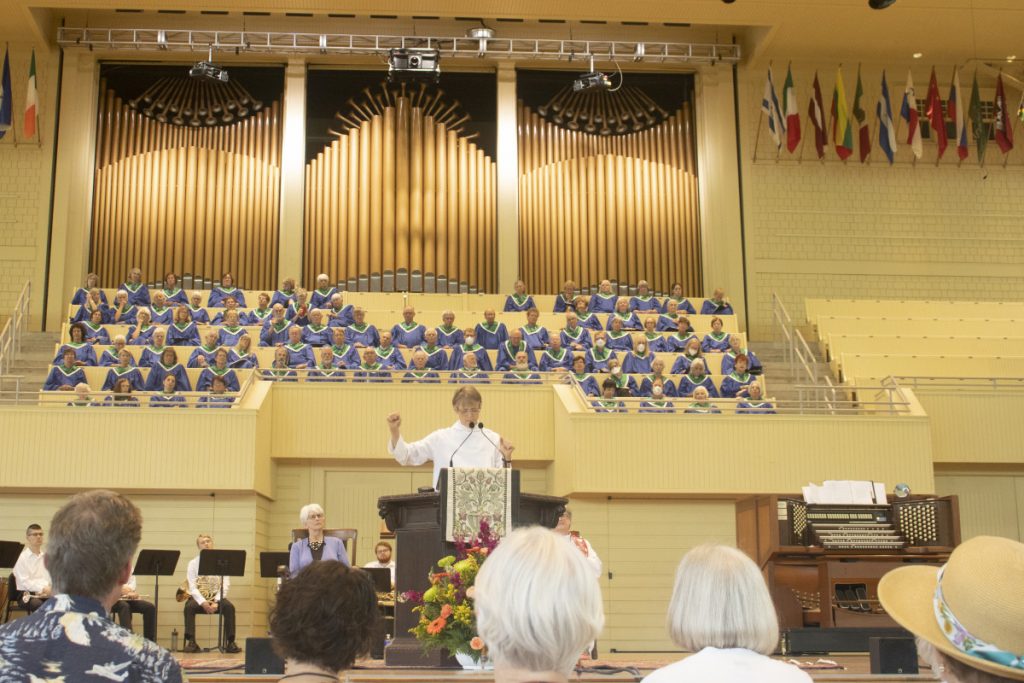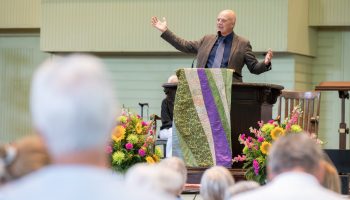“It can come in the aftermath of a disappointment, grief, a dream or a mountaintop event. A new opportunity beckons in our personal life, or the other side of the planet, and we know we must start and move toward it,” said the Rt. Rev. Mariann Edgar Budde at the 9:15 a.m. Wednesday, June 29, morning ecumenical worship service in the Amphitheater. Her sermon title was “Deciding to Start,” and the Scripture was Luke 9:51-62.
Like deciding to go, deciding to start involves movement. But the similarity ends there, Budde said.
“There is a low level of change at the beginning, and it is a quiet, solitary experience,” Budde said. “We begin with small steps, and the journey is long enough that we don’t know if we will ever get there. There is a beginning moment that no one noticed.”

Budde shared a story about a parishioner, Cindy, who after having her third child, decided she was going to become a nurse. Cindy had never gone to college and had not done well in high school. She waited tables and worked low-level office jobs. She and her husband worked full-time as they raised their family.
Cindy started taking one night class a semester to complete the prerequisites for nursing school; it took her six years. She decided to go full-time to get her nursing degree.
“She remained active in the church,” Budde said. “It was easy for us to forget that she was going to school.”
Fifteen years later, Budde asked Cindy if she remembered the moment she decided to pursue her nursing degree. Her first inspiration was her grandfather, who was an endocrinologist at the Mayo Clinic. When her son was born, the memory of her grandfather’s work came to her in a dream.
Cindy’s second inspiration was a class she took at church. The instructor asked people to draw a vertical line on a piece of paper, put their birth date at the bottom and an aspirational date for their death at the top. The instructor prompted the students to mark where they were on the line and asked, “What do you want to do with the time you have left?”
Budde asked Cindy if she ever thought about giving up, and she said, “Yes, but I just kept going. I don’t regret how long it took.”
In reading the Gospels, we often miss the time that Jesus turned toward Jerusalem.
“It is like Luke buried his lede,” Budde said.
Jesus had been on a mountaintop with the great leaders of his faith, and it was time to start the journey to his death.
“In the 78-mile walk he took from Galilee to Jerusalem, Jesus’ life looked the same as before. He teaches, heals, speaks to outcasts, has dinner with Mary, Martha and Lazarus. We forget this took place while he was walking to his destiny,” Budde said. “Only he could see it, and he did not have time for those who hesitated. Even the disciples try to ignore that Jesus won’t be with them for much longer.”
While the nature of the initial call is private and each decision is unique, the experience is universal. As an example, Budde talked about the growth of a child, and she asked: When does a child decide to start to walk or talk? It takes agency to take those first steps, and choice begins to take a larger role in the child’s life, like riding a bike or playing a musical instrument. The child starts to take risks and becomes vulnerable to learn something new.
“This is not unique to humans, my husband Paul tells me,” Budde said. “Certain birds migrate from one end of the continent to the other. How do they stay on course?”
Humans have the capability to envision a destiny beyond where they are. At times, the decision is clear, like taking a class. Some times, as author E.L. Doctorow wrote, “Writing is like driving at night in the fog. You can only see as far as your headlights, but you can make the whole trip that way.”
For Budde, becoming a bishop was like being part of a relay race, as one generation passes the baton to the next.
“When we look back, we tend to gloss over the changes. We take them for granted,” Budde said. “And sometimes we undo those changes.”
Thurgood Marshall, lawyer and Supreme Court justice, showed up in segregated courtrooms for years to dismantle Jim Crow laws before winning the Brown vs. Board of Education decision to desegregate schools.
“What faded in his story was how long and hard he had worked before Brown,” Budde said. “He got respect from racist white judges and attorneys.”
Marshall was born in 1908, the same year there was a resurgence of white supremacy and the use of lynching as social control. Marshall went to college and then to Howard University School of Law where the dean, Charles Hamilton Houston, became his mentor.
“As we face the implications of Supreme Court decisions today,” Budde said, “we must remember our forebearers. Not many of them saw their goal to fruition. We have to keep hope alive for all and equip a new generation to take up the race, to keep the vision of what could be, step by step.”
In starting, we put ourselves in the way of the Spirit, she told the congregation.
“We have to learn to persevere and be brave. I invite you to gather and share some of the brave stories of your own lives,” she said. “Whether you decided to go, stay, or start, share how you learned to be brave.”
The Rev. George Wirth, retired senior pastor of First Presbyterian Church, Atlanta, presided. Melissa Spas, vice president of religion for Chautauqua Institution, read the Scriptures. For the prelude, Alexander Davis-Pegis, cello, played “Prelude” from Cello Suite No. 1, by Johann Sebastian Bach. The Motet Choir, under the direction of Joshua Stafford, director of sacred music and holder of the Jared Jacobsen Chair for the Organ, sang “I Have Decided to Follow Jesus,” arranged by Kevin Boesiger. The choir was accompanied by Alexander Davis-Pegis, cello, and Nicholas Stigall, organ scholar, on piano. The postlude was an improvisation by Stafford on the Massey Memorial Organ. Support for this week’s services is provided by the Samuel M. and Mary E. Hazlett Memorial Fund.




